We include products in articles we think are useful for our readers. If you buy products or services through links on our website, we may earn a small commission.
The Real Causes of Heart Disease: Inflammation, Carbs, PUFAs
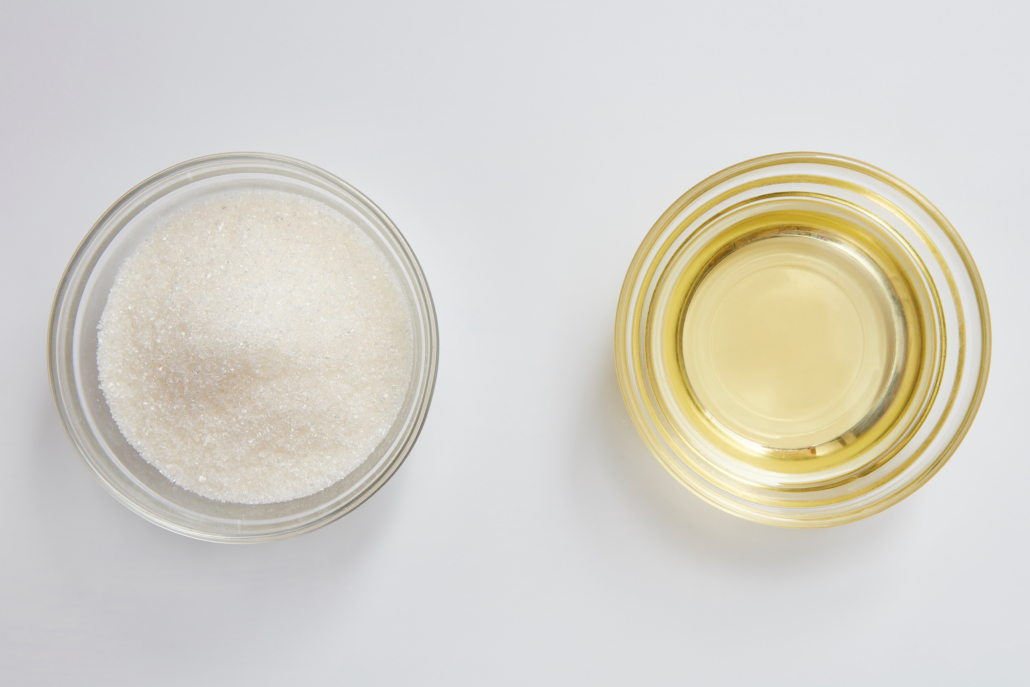
Since the 1960s, we’ve been told that eating animal fat and cholesterol cause heart disease.
What if we told you this was all a lie?
Mainstream modern science tells us that consuming saturated fat and cholesterol is not associated with heart disease.
Surprised? We don’t blame you. The anti-fat, anti-meat propaganda machine is remarkably influential.
This all begs the question, what is the real cause of heart disease?
In this article, we’ll explore how the false narrative of heart disease was created. And we’ll examine the modern science revealing the real lifestyle factors that cause heart including, including industrial seed “vegetable” oils and chronically high carb intake.
Table of Contents
When did the Demonization of Fat and Cholesterol Begin?
The demonization of animal fat and cholesterol began in the 1960s with the infamous Seven Countries Study by Ansel Keys.
Keys was a dominating personality, and his study erroneously linked heart disease with cherry-picked data came at a time when heart disease was on the rise in America. People were hungry for an answer, and his was false, but simple: eat animal fat, raise your cholesterol, get heart disease.
His solution? Replace animal fats with vegetable oil. Below, we’ll show what a complete disaster that has been.
Keys’s study was so timely that he was featured on the cover of Time magazine.
Among the many problems with Keys’s study, the biggest is the data he omitted. If he included all 22 countries that he gathered data from, it would have shown a weak correlation between saturated fat intake and heart disease.
Additionally, Keys’s study was “observational.” It depended on participant reports and memories of what they ate over long periods of time.
Epidemiological “observational” studies are considered the lowest quality data. They cannot tell us the cause, only the correlation. They are not meant to be the basis of health policy but to point the direction towards higher quality randomized control Trials.
Another problem with Keys’s study is that it omitted high-fat diets of traditional cultures with very low incidences of heart disease. The traditional Tokelau, Masai, and Inuit peoples all thrives on extremely high saturated fat diets, yet they have equally extremely low incidences of cancer, stroke, and diabetes.
But you don’t need to look at data from ancient cultural diets to see that Keys’s “diet-heart hypothesis” is a myth. Look at the data from the modern European continent. It shows the opposite of Keys’s conclusions: The more saturated fat a population consumes, the less heart disease.
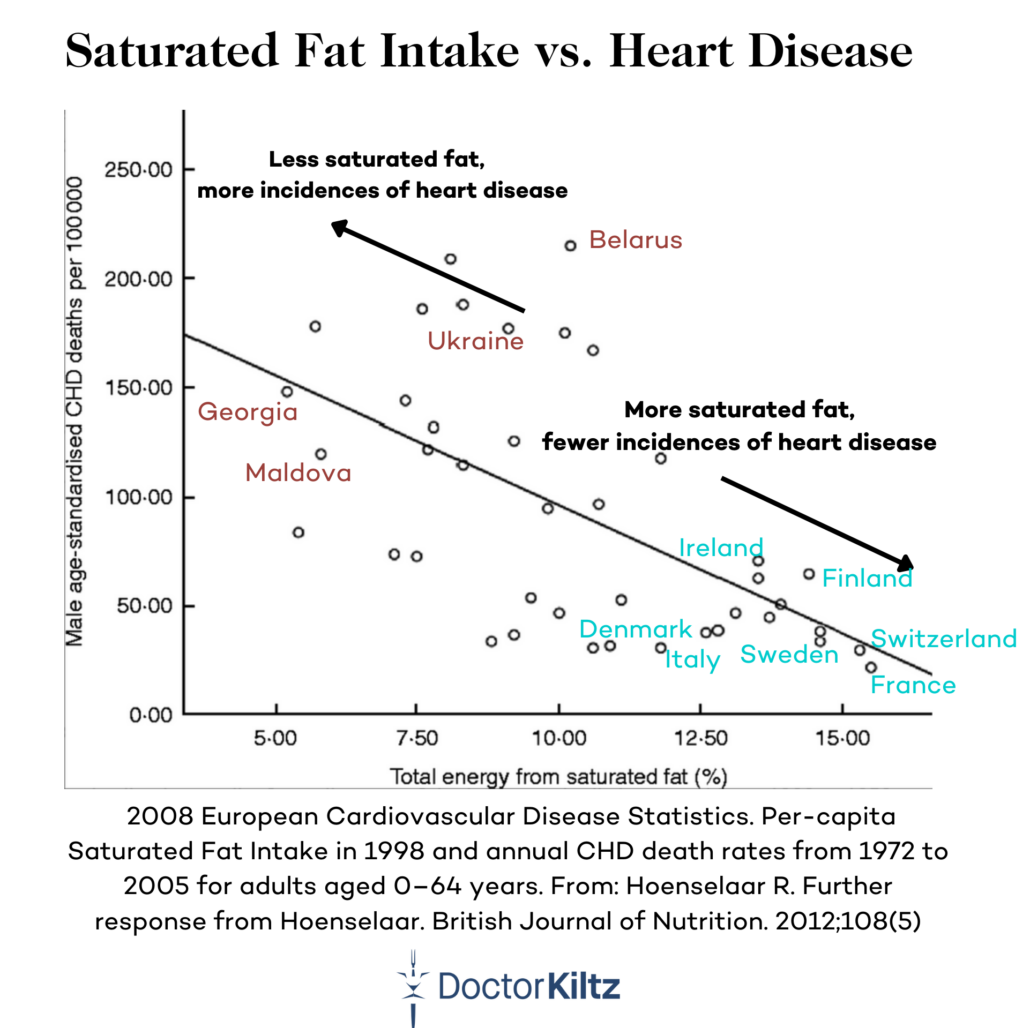
There is also the issue of manipulated science exposed by pioneering science journalist Nina Tiecholz. The results of Tiecholz’s 10-year research project found that Proctor & Gamble, the company behind Crisco, funded the American Heart Association, essentially buying its recommendations to cut animal fats and increase vegetable oil consumption.
The results of this campaign to scare Americans away from healthy animal fats, and to consume more toxic vegetable oils have been catastrophic.
The graphs below chart a correlation between reduced animal fat intake over the last century, substituting Partially Unsaturated Fatty Acids (PUFA) from “vegetable” seed oils, and spiking rates of modern diseases.
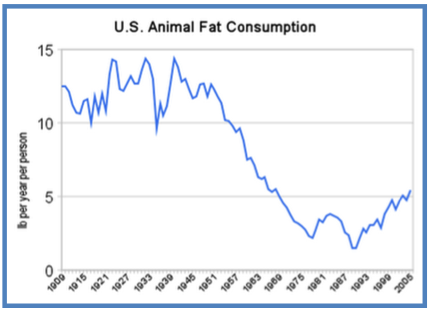
Source: NAHNES
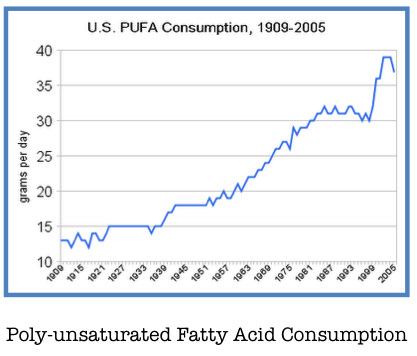
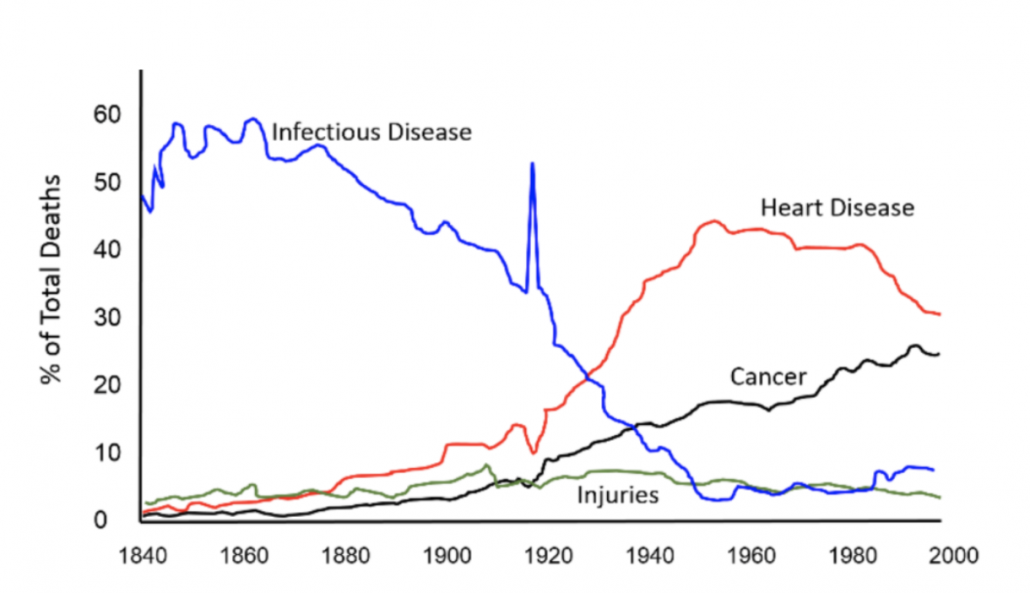
What Does Modern Science Say About Saturated Fat and Heart Disease
Take a look at this 2020 systematic review (the gold standard of research) published in the Journal of the American College of Cardiology. It was authored by more than a dozen international researchers from the world’s most respected medical schools.
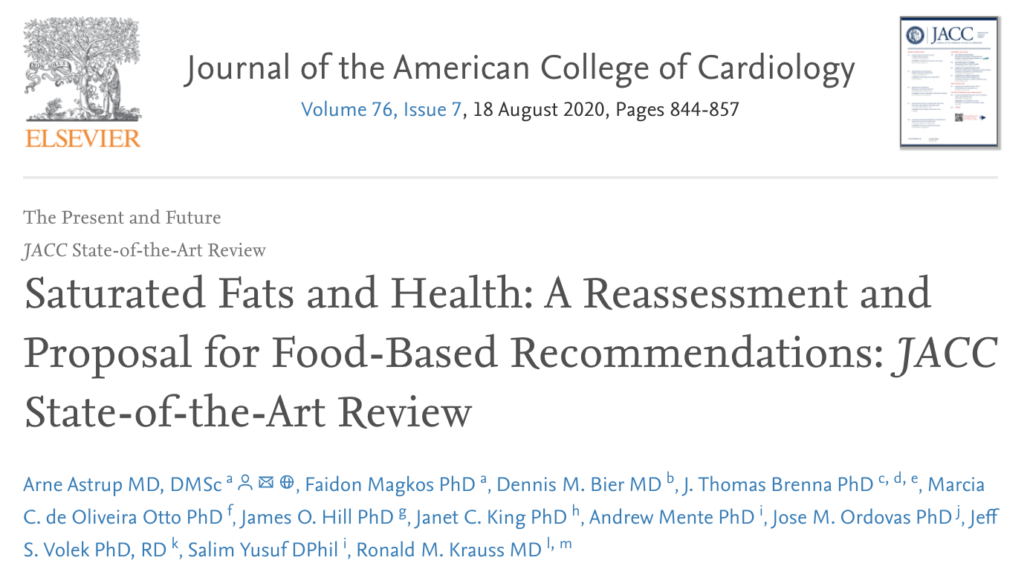
The study concluded, “although intake of processed meat has been associated with increased risk of CHD (coronary heart disease), intake of unprocessed red meat is not, which indicates that the saturated fat content of meat is unlikely to be responsible for this association.”
The researchers also state that “Whole-fat dairy, unprocessed meat, and dark chocolate are SFA-rich foods with a complex matrix (of nutrients) that are not associated with increased risk of CVD. The totality of available evidence does not support further limiting the intake of such foods.”
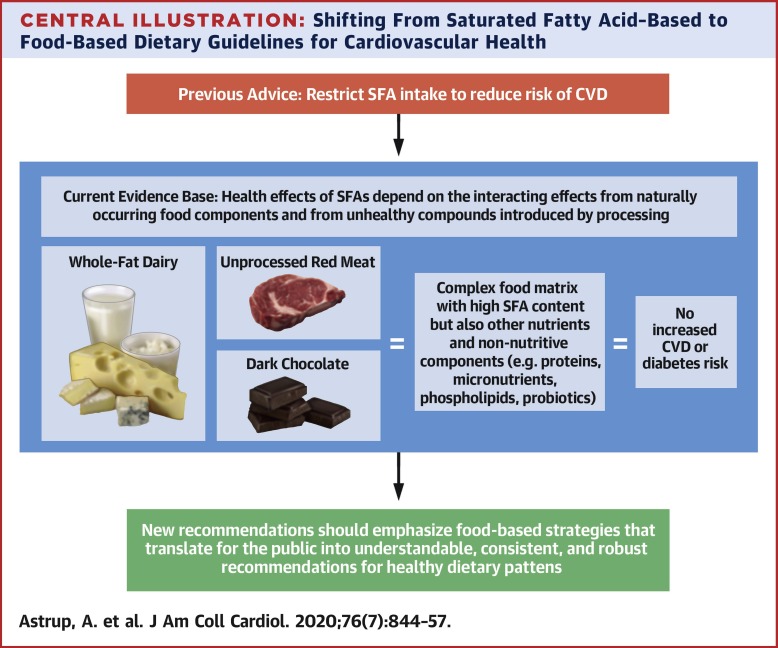
Similar findings are reflected in this 2015 meta-analysis of 12 high-quality studies. The researchers found that saturated fats are not associated with all-cause mortality, CVD, CHD, ischemic stroke, or type 2 diabetes.
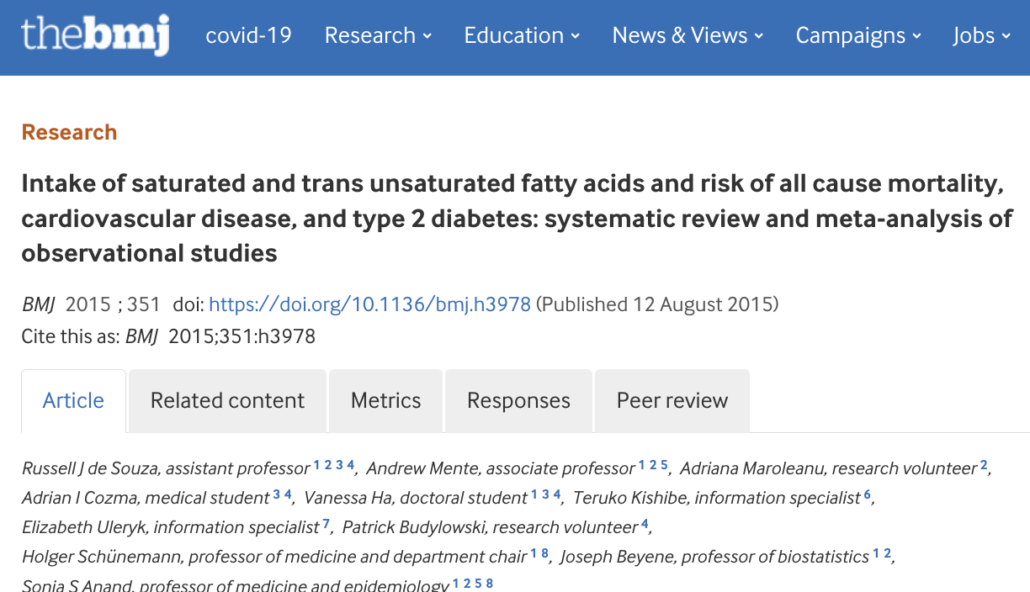
At the risk of getting repetitive–though it bares repeating, here is another systematic review of 15 randomized controlled trials with 59,000 participants. It found no significant benefit from reducing saturated fats on heart attacks, strokes, and all-cause mortality.

Still not convinced? Here’s another meta-analysis with a clear message to the anti-fat fascists.
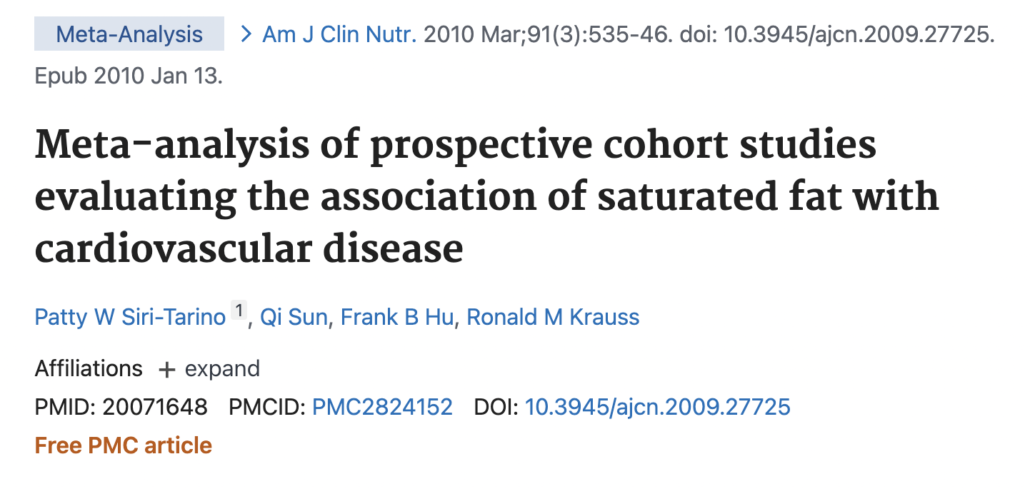
The researchers state, “there is no significant evidence for concluding that dietary saturated fat is associated with an increased risk of CHD or CVD. More data are needed to elucidate whether CVD risks are likely to be influenced by the specific nutrients used to replace saturated fat.” By specific nutrients, they’re referring to sugar and PUFA vegetable oils. More on these below.
One more for good measure? This 2014 meta-analysis concluded that there is no evidence supporting guidelines that encourage high consumption of polyunsaturated fatty acids (from seed “vegetable” oils) and low consumption of total saturated fats.
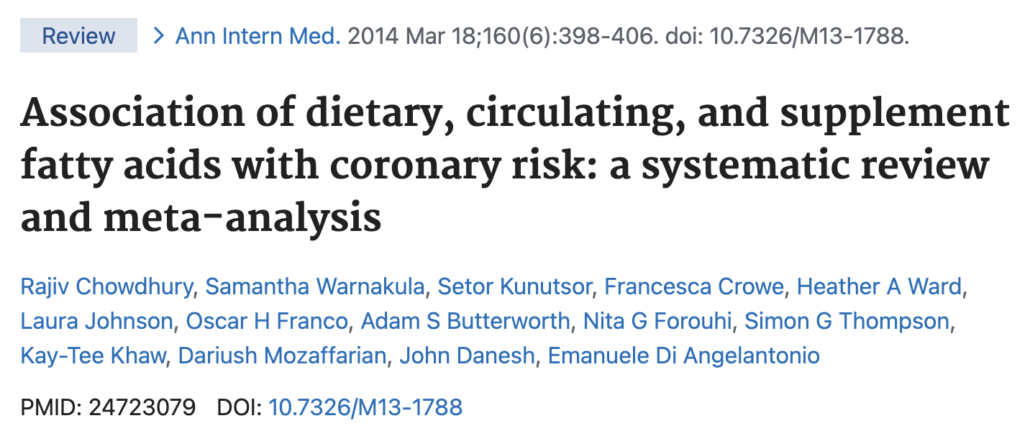
What about Cholesterol?
Our bodies produce around 70% of our cholesterol on their own and tightly control these levels.
Numerous studies show that foods high in dietary cholesterol have very little impact on blood cholesterol levels in most people
Cholesterol is an extremely important substance responsible for a healthy nervous system, the production of hormones, the integrity of our cells, and the digestion of fats.
So what do high-cholesterol foods actually do to our cholesterol? Let’s take the case of eggs–one of the highest cholesterol foods on earth.
Studies show that eggs consistently increase HDL (“good”) cholesterol.
For 70% of people who eat eggs, there is no increase in total or LDL cholesterol. Some people may experience a mild increase in a benign subtype of LDL that does not affect cardiovascular function.
Then there’s this massive egg study on 500,000 Chinese adults.
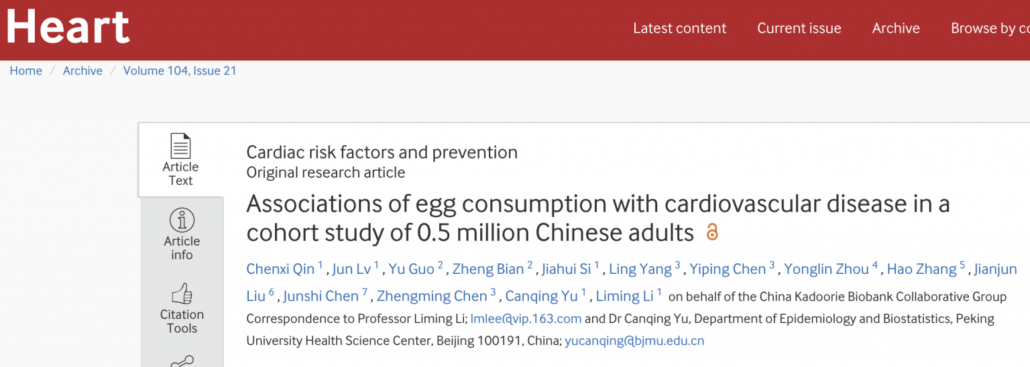
Researchers found that people who ate eggs daily had [5] :
- 14% lower risk of major cardiac events
- 11% lower risk of CVD
- 12% lower risk of ischemic heart disease
- 18% lower risk of CVD death
If Saturated Fat and Cholesterol Don’t Cause Heart Disease, What Does?
Not only does modern science tell us that saturated fat does not cause heart disease, it reveals that the foods we substitute for high-fat animal products, namely high-carb grains and industrial vegetable oil, are the root cause of heart disease.
In fact, research shows that heart disease is an inflammatory disease caused by carbs and PUFAs from vegetable oils.
The title of this 2017 study in the British Journal of Sports Medicine does not mince words. “Saturated Fat does not clog arteries: coronary heart disease is a chronic inflammatory condition the risk of which can be effectively reduced from healthy lifestyle interventions.”
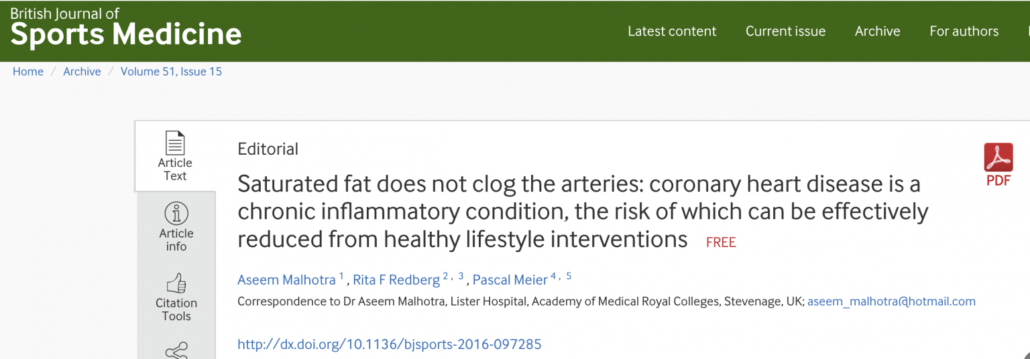
The authors of the above study write:
- Coronary artery disease pathogenesis and treatment urgently require a paradigm shift. Despite popular belief among doctors and the public, the conceptual model of dietary saturated fat clogging a pipe is just plain wrong.
- A landmark systematic review and meta-analysis of observational studies showed no association between saturated fat consumption and (1) all-cause mortality, (2) coronary heart disease (CHD), (3) CHD mortality, (4) ischaemic stroke or (5) type 2 diabetes in healthy adults. [2]
- Similarly, in the secondary prevention of CHD there is no benefit from reduced fat, including saturated fat, on myocardial infarction, cardiovascular or all-cause mortality.2
- In an angiographic study of postmenopausal women with CHD, greater intake of saturated fat was associated with less progression of atherosclerosis, whereas carbohydrate and polyunsaturated fat intake were associated with greater progression. [3]
Let’s take a closer look at how high carbohydrate and PUFA industrial seed “vegetable” oil intake causes chronic inflammation that leads to heart disease.
Carbs and Heart Disease
In this 2020 meta-analysis of high and low-carb diets on risks of heart disease, the authors stated, “Diets with high levels of carbohydrates, especially refined or high glycemic index carbohydrates, also appear to be associated with hypertension, coronary heart disease, obesity, type 2 diabetes, metabolic syndrome and increased risk of mortality.

While this 2006 study found that getting more than 60% of your calories from carbs lowers your “good” HDL cholesterol. At the same time, it raises triglycerides–both of which can have negative consequences on your heart health.
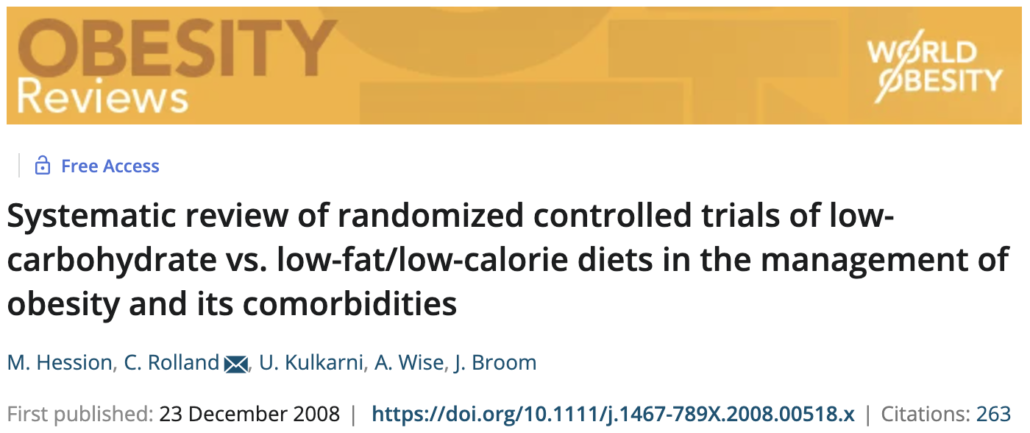
Likewise, this systematic review of randomized control trials comparing low-carb (high-meat) diets vs. low-fat diets found significantly better outcomes regarding cardiovascular health, weight loss, and blood sugar regulation from the high-fat low-carb diet.
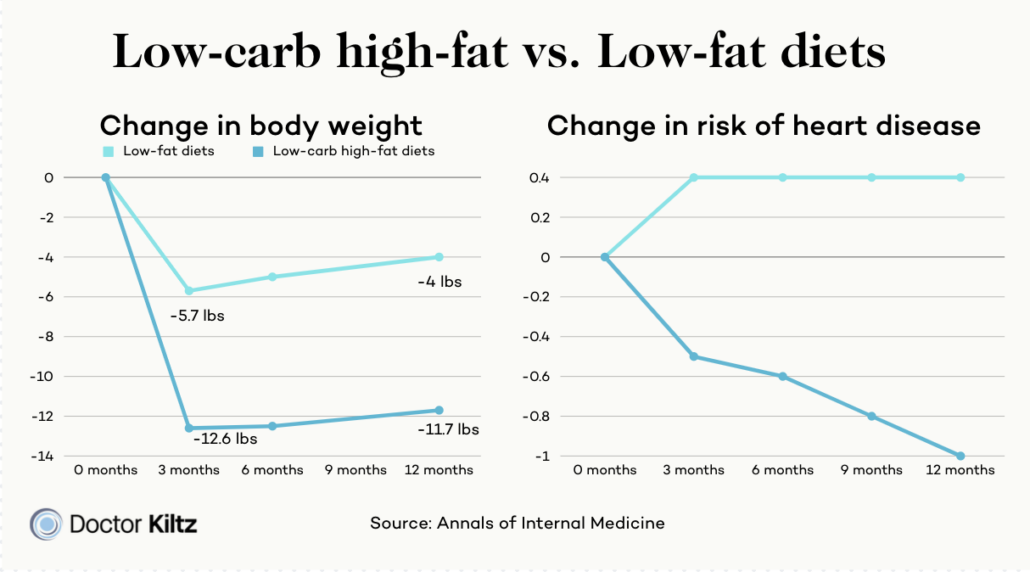
Seed “Vegetable Oils” and Heart Disease
Most seed “vegetable” oils are high in an Omega-6 PUFA called linoleic acid, making them a highly inflammatory food.
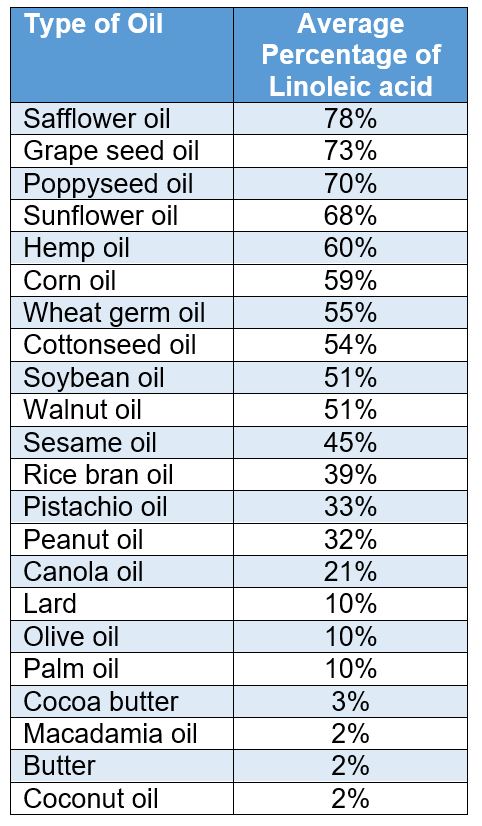
Linoleic acid is a precursor for a pro-inflammatory molecule called arachidonic acid, itself a precursor for over twenty pro-inflammatory eicosanoids.
Eicosanoids signal your body’s immune system to react as if it is being damaged. The constant inflammatory response to perceived damage results in chronic inflammatory diseases, including heart disease.
Studies linking Seed “Vegetable” Oil With Heart Disease
A major 2016 randomized control trial known as the Minnesota Coronary Experiment found that the group of participants who increased their intake of corn oil and margarine had 86% more heart attacks.
The study also found that participants 65 and older had a higher risk of death after four years.
Ironically, the study was undertaken to explore how replacing saturated fat like butter, tallow, and fatty meats with vegetable oil would lower cholesterol and therefore reduce the risk of heart disease.
Fascinatingly, the vegetable oil group did lower cholesterol but were significantly more likely to die from heart attack.
The researchers concluded:

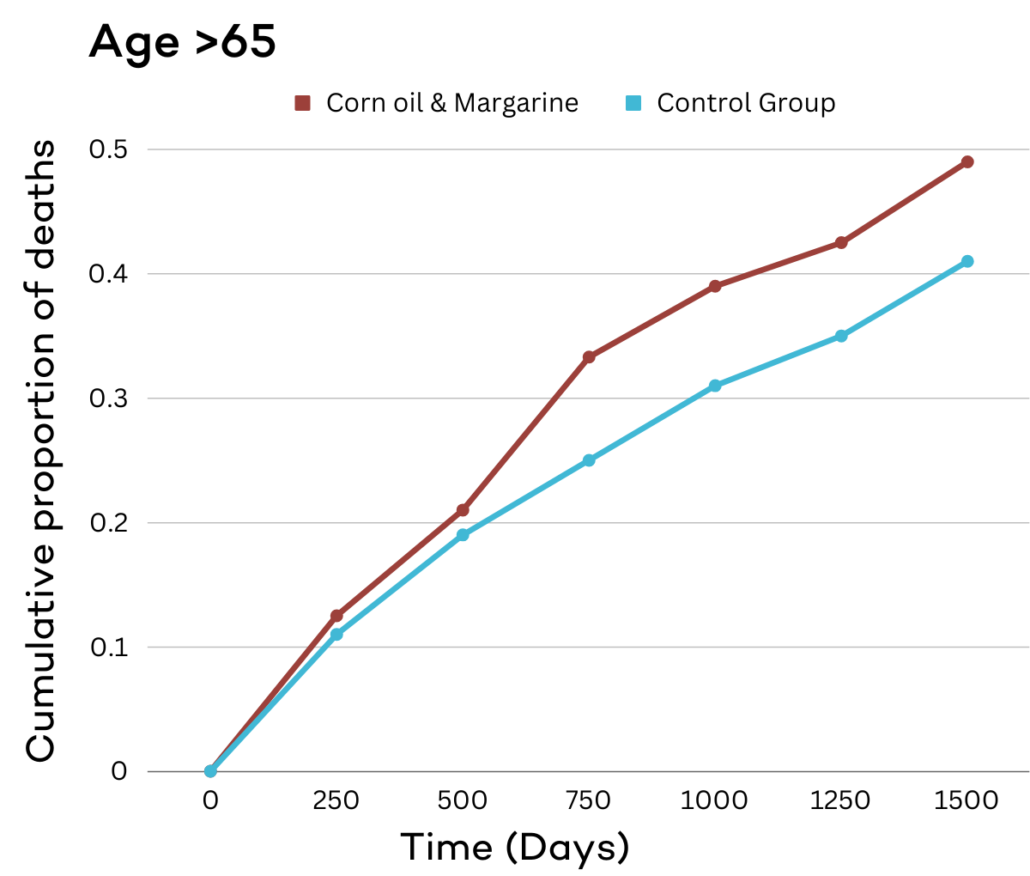
Adapted from Jeff Noobs
In the 2002 MARGARIN Study, 282 participants with multiple heart disease risk factors were randomly selected into two groups.
One group consumed margarine high in linoleic acid from vegetable oil. The other ate margarine high in Omega-3-rich fish oil.
After two years, the number of strokes, heart attacks, and cardiovascular deaths was 700% higher in the group consuming high linoleic vegetable oil margarine.
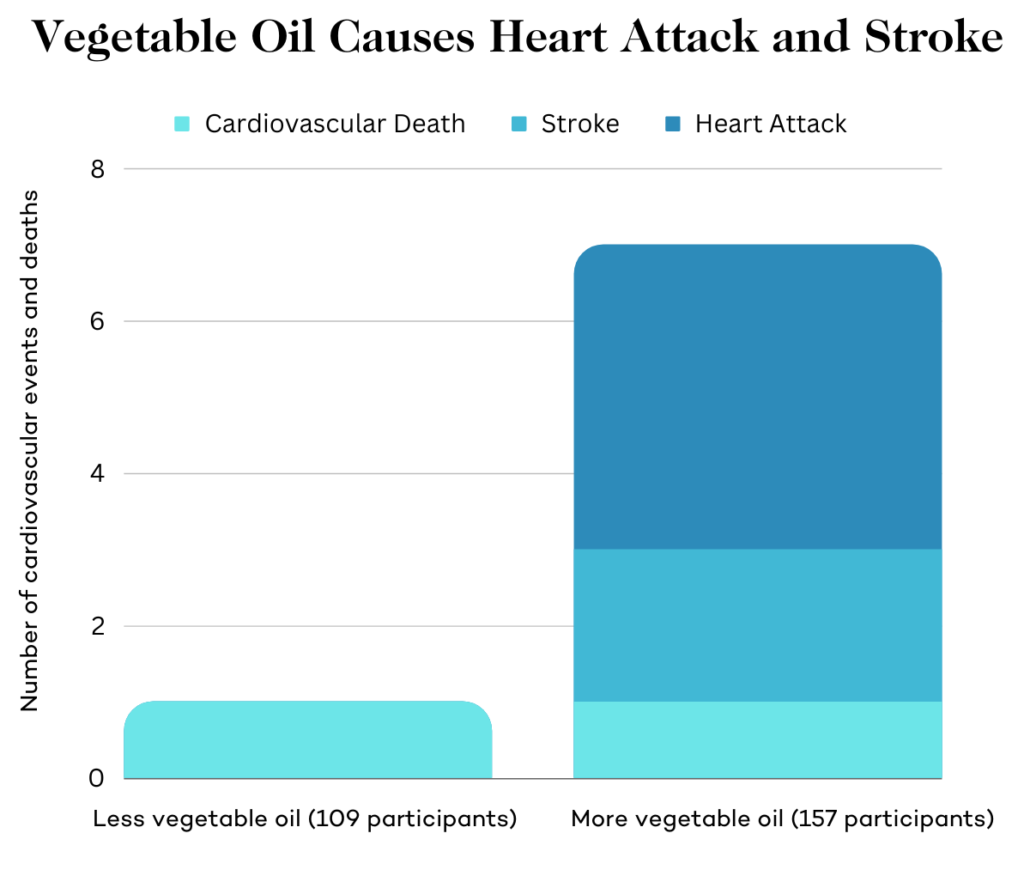
Adapted from Jeff Noobs
Then there’s the classic Rose Corn Oil Trial from 1962. This study explored the effects of replacing standard dietary fats from meat, dairy, and fish with corn oil.
92% of the participants from the group consuming corn oil experienced an increase in cardiac events. The corn oil group also suffered a 364% increased risk of death.
Observational studies routinely show a significant association between omega-6 fatty acid intake from vegetable oils and increased incidences of heart disease.
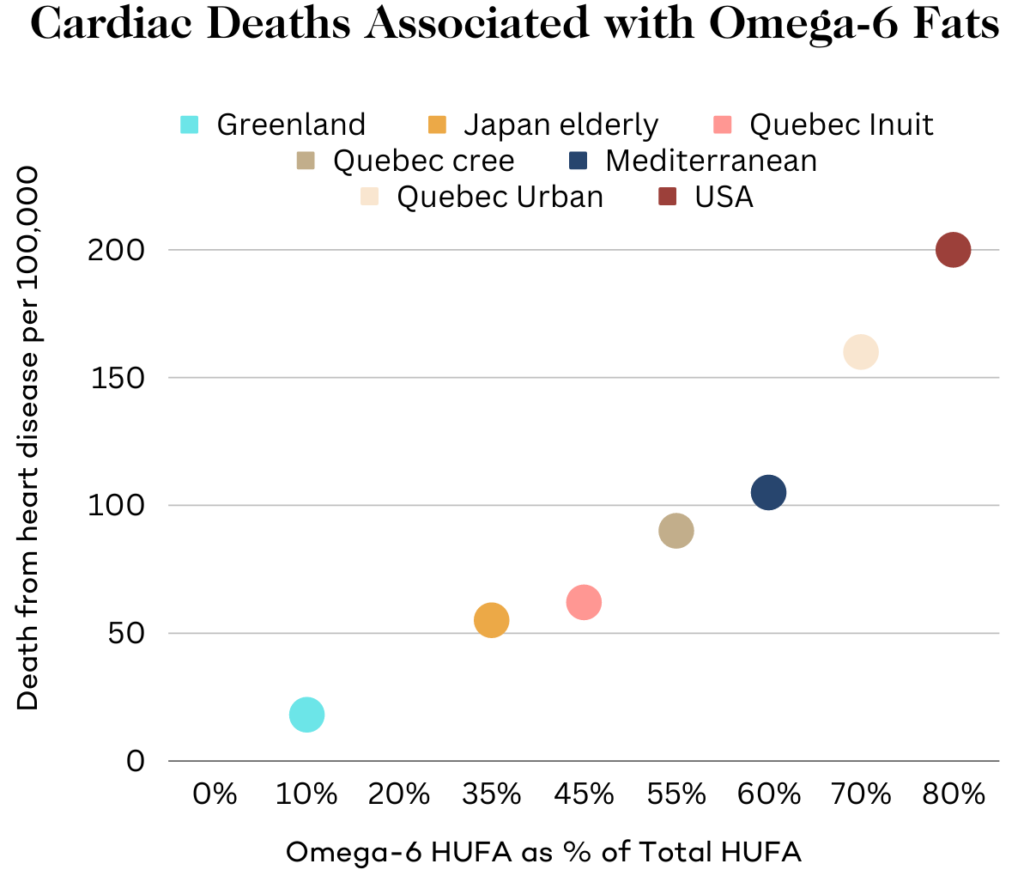
Adapted from Jeff Noobs
In the major 2013 Sydney Diet-Heart Study, researchers separated study participants into two groups. The total fat intake of both groups was the same. The difference was that one group was given primarily linoleic acid from vegetable oil and margarine. While a second group got most of their fat from butter and fatty meat.
Over the study’s seven years, the vegetable oil group had a 62% greater all-cause mortality rate.
Of all known risk factors, only morbid obesity and smoking are more likely to kill you than vegetable oils. And since we know that vegetable oil is strongly associated with obesity, it’s likely that vegetable oil is by far the most dangerous lifestyle factor.
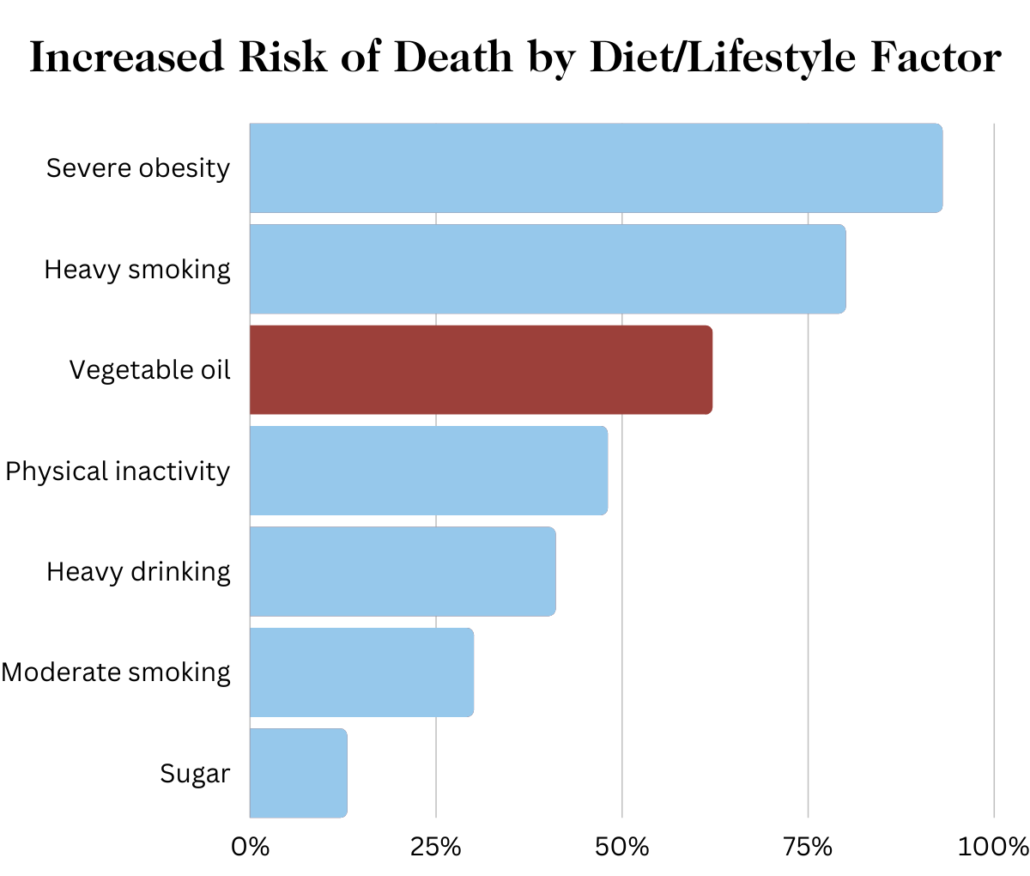
Adapted from Jeff Noobs
“↑” = “Increased consumption of”; Severe obesity: BMI 35–40 [a]; Heavy smoking: ≥10 cigarettes/day (avg 21.97 or ~1 pack) [b, c]; Vegetable oil: Increase consumption by 12% of calories [d]; Physical inactivity: <2 times/week [e]; Heavy drinking: >14 drinks/week for men or >7 drinks/week for women [f, g, h]; Moderate smoking: <10 cigarettes/day [i] Sugar: ≥73.2g sugar/day for women or ≥79.7g sugar/day for men [j]; ; Air pollution: per 10 μg/m3 long-term exposure to PM 2.5 [n, o]
In the 2012 study below, researchers found that the increased intake of Omega-6 polyunsaturated fatty acids has created a 15:1 omega-6 to omega-3 imbalance.

They identify this overabundance of PUFA as the root cause of increases in inflammatory diseases, including heart disease.

In this 2018 study, researchers found that high LDL (the boogeyman of cholesterol panels) is only a dangerous marker of heart health in the context of a diet high in omega-6 PUFAs from vegetable oils.
The researchers also discovered that heart attack patients have far higher levels of linoleic acid in their arteries than healthy patients.
Additionally, the study found a positive correlation between the severity of heart attacks and arterial plaque buildup from omega-6 fatty acids.
Other Causes of Heart Disease
Though high-carb diets and industrial seed oils are likely the main culprits behind high rates of heart disease in the modern world, there are two other factors to consider–smoking tobacco and stress.
Tobacco
Numerous studies link smoking with increased inflammation and heart disease.5
A 2004 study even directly linked smoking with inflammation in the atherosclerotic plaques, increasing risk of rupture that blocks arteries–a heart attack 101.
Psychosocial Stressors
Our inflammatory systems evolved over 2 million years as hunter gatherers. We lived in close-knit bands, ate mostly fatty meat, and rested a lot. Modern life bombards us with stress via media, demanding jobs, and separation from stress-relieving social connections.
All this modern psychosocial stress keeps our inflammatory systems dialed up 24/7.
Studies show that people suffering from anxiety and depression, and even those with more anger and cynicism, have higher markers of inflammation and higher incidences of heart disease.
While practices that reduce stress have been shown to reduce inflammation and heart disease risk.
The Real Cause of Heart Disease: The Bottom Line
Despite the anti-fat dogma that’s persisted since the 1960s, there is no scientific support for the hypothesis that consuming saturated fat and cholesterol increases the risk of heart disease.
In fact, consuming more fatty animal products in the context of a low-carb diet has been shown to reduce numerous heart disease risk factors.
Ironically, the preponderance of evidence from modern high-quality studies tells us that heart disease is actually caused by chronic inflammation.
We also now know that chronic inflammation in the heart is caused by diets high in PUFAs from industrial seed “vegetable” oils, and high carbohydrate intake. At the same time, smoking tobacco and chronic stress have also been shown to increase the risk of heart disease.
Dr. Kiltz’s Three Pillars of Health and Wellness addresses all of these risk factors.





















